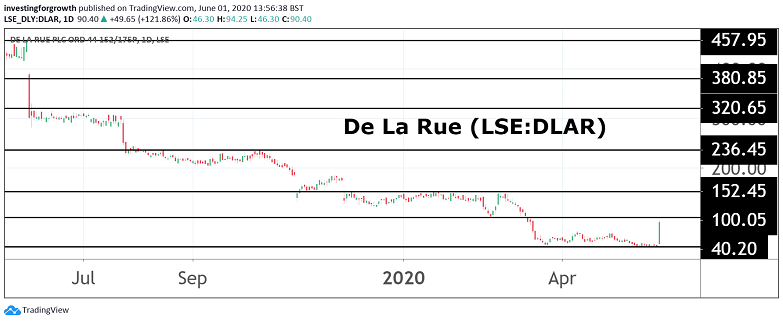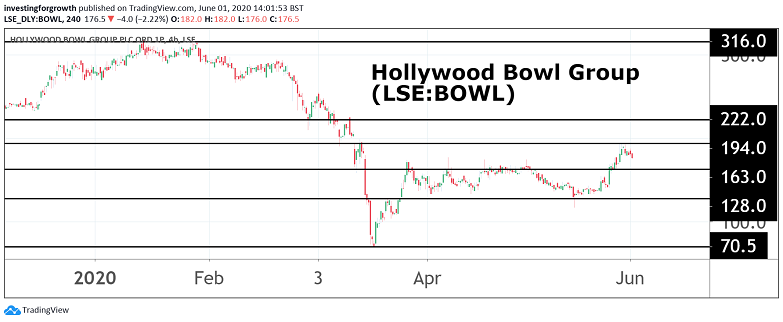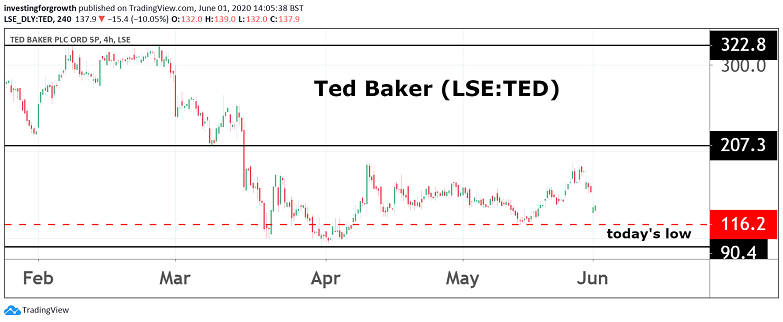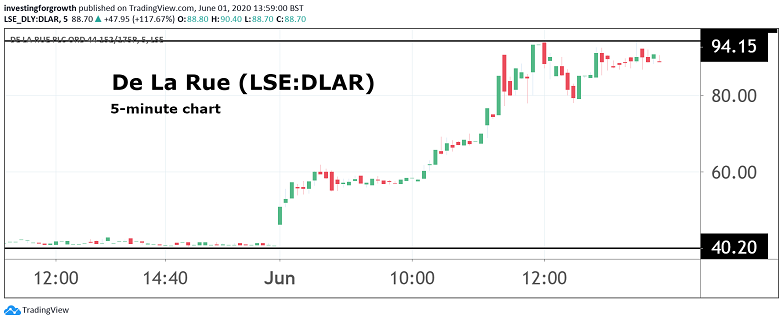This is why De La Rue shares are up 130% today
It’s all action at the start of another busy week, with beat-up stocks staging incredible recoveries.
1st June 2020 14:22
by Graeme Evans from interactive investor
It’s all action at the start of another busy week, with beat-up stocks staging incredible recoveries.

The post-lockdown prospects for Ted Baker (LSE:TED), Hollywood Bowl (LSE:BOWL) and Primark owner Associated British Foods (LSE:ABF) became a little clearer today during a robust session for London markets.
AB Foods was the biggest riser in the FTSE 100 index, up 7% after confirming its stores in England will be trading from 15 June to add to the third of selling space already open elsewhere.
Shares in highly-rated Hollywood Bowl also held on to recent gains after the ten-pin bowling company set out its re-opening strategy alongside half-year results. There was little immediate respite for Ted Baker investors, however, with the fashion label's share price remaining near a record low after launching a heavily-discounted £95 million fundraising at just 75p a share.
One of the most eye-catching moves of the session came from De La Rue (LSE:DLAR), whose beleaguered share price more than doubled after the bank note printer reported a strong start to its new financial year to offset fears about the impact of Covid-19 on its operations.

Source: TradingView. Past performance is not a guide to future performance.
Overall, the FTSE 100 index bounced back after losing 2% of its value on Friday, helped by a late rally on Wall Street following London's close for the weekend. The top-flight was 1% higher at 6,138, driven by demand for heavily-sold stocks including Carnival (LSE:CCL) and Rolls-Royce (LSE:RR.).
With investors also continuing to search for value opportunities as the UK economy re-opens, the domestic-focused FTSE 250 index rose 1.2% to maintain the form that has lifted the mid-cap benchmark by 12% since 14 May. Big risers in the second-tier included Marks & Spencer (LSE:MKS) after the retailer's shares climbed back above 100p with a 5% improvement.
Among smaller caps, Hollywood Bowl has continued to catch the eye of investors looking for stocks with the potential to rebound after the Covid-19 shutdown. Its shares are already up 36% since mid-May, when the company further strengthened its balance sheet by placing new shares in a £10.5 million City fundraising.

Source: TradingView. Past performance is not a guide to future performance.
While its immediate focus remains on mitigating the impact of the crisis, CEO Stephen Burns said today the company was “as well positioned as we can be” for when it is possible to reopen. He has also secured debt covenant waivers or amendments up until 2021, as well as a £10 million extension to its revolving credit facility.
The group, which has 61 centres operating under the Hollywood Bowl, AMF and Puttstars brands, said its reopening strategy would include various social distancing measures, such as the use of alternate lanes, pre-booking for peak periods and queue control measures.
It had been trading strongly prior to the lockdown, with like-for-like sales for the period up to the closure of the estate on 20 March showing 8.6% growth on a year earlier. Average spend per game increased 2.1% to £10.19.
Burns added that the company was well-placed to pursue growth opportunities should they arise:
“Due to our highly cash generative business model and following a very successful trading period prior to the Covid-19 restrictions, the group's balance sheet is strong.”
- Ian Cowie: tomorrow’s big winners in Asia
- Prospects for UK bank shares
- The Week Ahead: Pennon, Young & Co, Wizz Air
Unlike Hollywood Bowl, whose share placing was undertaken from a position of strength, Ted Baker's request to shareholders for £95 million has come after a long period of underperformance. The stock, which had once been viewed by analysts as reassuringly expensive at around 30 times forward earnings, offered new shares at a 50% discount to their closing price on Friday.

Source: TradingView. Past performance is not a guide to future performance.
The fundraising is part of a turnaround strategy built over the past six months by new CEO Rachel Osborne.
Her plan — dubbed “Ted's Formula for Growth” — will focus on re-energising the product and brand, as well as the prioritisation of digital and capital light growth and significant cost reductions.
Her ultimate goal is a more profitable business with higher free cash flow generation and higher return on capital employed.
She said: “The Ted Baker brand is much loved, it has a unique personality and character built up over many decades, and that provides us with a remarkably strong foundation from which to continue our international growth.”
- Shares for the future: why I’m losing sleep over these stocks
- Take control of your retirement planning with our award-winning, low-cost Self-Invested Personal Pension (SIPP)
The scale of the challenge was highlighted in full-year results covering the period before Covid-19. They showed that retail revenues fell 4.6% to £439.9 million, with the reduced underlying gross margin of 55.6% impacted by the need for increased promotional activity.
Underlying profits dived by £53 million to just £4.8 million in the year to 25 January. Covid-19 disruption also meant total retail sales including online fell 34% for the period up until 2 May.
Another stock in the early stages of a turnaround - De La Rue - appears to be much less impacted by the pandemic than many investors expected. The stock finished last week at a record low of just above 40p, only to rocket above 94p briefly on the back of today's optimistic update.

Source: TradingView. Past performance is not a guide to future performance.
It has been buoyed by some significant contract wins, including a five-year agreement for its authentication division to supply polycarbonate data pages for the new Australian passport.
In currency, it has countered expectations that Covid-19 will hasten the demise of cash by securing contracts worth 80% of its available printing capacity.
This means the currency division remains on track to achieve a mid-teens adjusted operating margin in 2020/21.
De La Rue shares had been changing hands for more than £5 as recently as August 2018, only to be laid low by over-capacity in the currency printing industry and by the conclusion of its UK passport contract.
The dividend was sacrificed in November amid a jump in the company's debt pile to £170 million by the end of September.
Turnaround specialist Clive Vacher, who arrived as CEO in October, has brought a focus on accelerated cost savings, as well as on the company's growth in polymer banknotes and further momentum in product authentication services.
These articles are provided for information purposes only. Occasionally, an opinion about whether to buy or sell a specific investment may be provided by third parties. The content is not intended to be a personal recommendation to buy or sell any financial instrument or product, or to adopt any investment strategy as it is not provided based on an assessment of your investing knowledge and experience, your financial situation or your investment objectives. The value of your investments, and the income derived from them, may go down as well as up. You may not get back all the money that you invest. The investments referred to in this article may not be suitable for all investors, and if in doubt, an investor should seek advice from a qualified investment adviser.
Full performance can be found on the company or index summary page on the interactive investor website. Simply click on the company's or index name highlighted in the article.